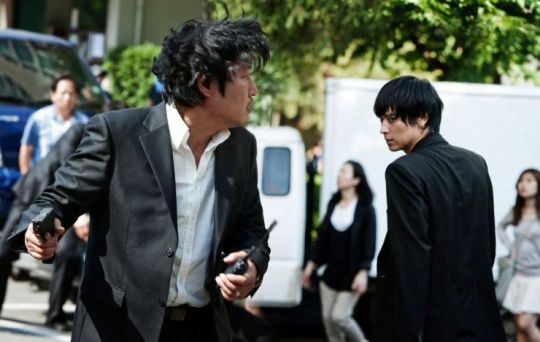The representation of an unspoken bond between the people of North and South Korea has widely existed in contemporary Korean cinema, emphasising the lack of difference between the two and the futility of fighting on ideological grounds. Arguably originating in Kang Je-gyu‘s Shiri (1999), which introduced a softer stance on communism and featuring common ground and relationships, the film was followed by other high profile additions including JSA (2000) and Welcome to Dongmakol (2005), and even television dramas such as Iris (2009).
Director Jang Hoon’s (장훈) second feature, and his first since breaking away from mentor Kim Ki-duk, addresses the concept in a different manner. Secret Reunion (의형제) – also known as ‘Brothers’ and ‘Blood Brothers’ – rejects the oft-utilised theme of war in exploring the notion of Korean brotherhood and instead focuses on more domestic notions of family and kinship. The result is a highly compelling and engaging thriller featuring great direction and wonderful performances, making Secret Reunion one of the best examples of the concept in recent years.
Lee Han-gyoo (Song Kang-ho (송강호) is the team leader of a specialist task force within the National Intelligence Service (NIS). His mission is to capture or kill the North Korean terrorist known only as ‘Shadow’ (Jeon Gook-hwan (전국환), yet the extremist is incredibly elusive. Working on a tip-off, Han-gyoo prepares his team for Shadow’s next strike against a North Korean defector, refusing to call in back-up in a bid to receive credit. Yet unbeknownst to Han-gyoo, Shadow employs the help of young and talented protege Song Ji-won (Kang Dong-won (강동원) for the execution. As the NIS move in to capture Shadow the mission goes horribly awry resulting in the deaths of several officers, with Shadow and Ji-won escaping incarceration. Several years later Han-gyoo, dismissed from the NIS for his conduct, coincidently meets Ji-won at a mining plant. Considered a traitor by the North, Ji-won has also been deserted. In a bid to redeem themselves, the men form a business partnership in order to steal information from each other and regain their honour.
Secret Reunion was the second highest grossing film of 2010 and it’s clear to see why. The script by Jang Min-seok (장민석) is highly character driven, featuring both central protagonists as flawed human beings striving to better themselves and define their existences. The writer skillfully combines an array of genre motifs from espionage-orientated action to domestic comedy whilst never feeling contrived, and as such the relationship that develops between Han-gyoo and Ji-won is organic and engaging. Director Jang Hoon capitalises on such a solid foundation with highly impressive visual flair, combining fast-paced adrenaline-fueled camera movement during action sequences, wonderful cinematography, and a keen sense of comedy. Both the script and direction consistently represent Han-gyoo and Ji-won as men with similar ideals, with ideological differences that do arise more generational than cultural.
The character development and relationship between Ji-won and Han-gyoo is where Secret Reunion shines. Han-gyoo’s arrogant and ambitious traits as an NIS agent are similar to Ji-won’s single-minded determination in assassinating a defector; yet when both protagonists are stripped of their roles they find common ground through notions of family and compassion. Divorced Han-gyoo psychologically and financially copes with the departure of his family by locating and reunifying runaway foreign wives with their Korean husbands, despite the brutality with which they were treated. While such a narrative thread conveys Han-gyoo’s torment over losing his family, it also explores an increasing problem in Korean society as men from the countryside marry – often through brokers – Vietnamese, Thai, Filipino and women from other developing countries, often abusing them upon arrival. As such, Secret Reunion conveys that focusing on older concerns of North/South relations overshadows more pressing current social and humanitarian issues, also expressed through the old age of Northern terrorist Shadow in comparison to the young women forced to flee. Ji-won exemplifies such a stance as his communist ideology is portrayed not so much as archaic nationalistic fervour but as equal rights for all, coping with the loss of his family by respecting the women he tracks down as he would his own wife.
In their roles as Han-gyoo and Ji-won, actors Song Kang-ho and Kang Dong-won prove why they are among the top talent in the industry. Both perform their roles highly convincingly and are compelling throughout. The range of genres within Secret Reunion also allows the actors to stretch their performances in different territories, from the tense action sequences to their comedic living arrangements, from sharing personal history to violent confrontations. The chemistry between them is a joy to watch, with the generational difference between them also conveying a ‘passing-of-the-torch’ of sorts from one talent to the other.
If there is criticism to be bestowed upon the film, it would be that there are not enough scenes that heighten the tension between them and dramatic moments in which personal history is expressed. The co-habitation between Han-gyoo and Ji-won is wonderfully comedic and conveys their brotherly similarities, yet opportunities are missed in which tension and paranoia could be embellished, as well as subtle mannerisms or anecdotes conveying the character’s philosophy and experiences to unite them closer. As such their business and living arrangements are enjoyable yet lose the immediacy of scenes prior.
Verdict:
Secret Reunion is an engaging and compelling film about the unspoken kinship between people of North and South Korea. With the highly competent script by Jang Min-seok, wonderful cast and the visual flair of director Jang Hoon, the film features an array of genres including suspense-filled action and comedic domestic sequences, as well as providing interesting social discourses regarding the abuse suffered by foreign wives. While additional scenes expressing further depth to the relationship between Han-gyoo and Ji-won would have been welcomed, Secret Reunion is incredibly enjoyable and adds a unique perspective on the bond shared between the people of the divided peninsula.
★★★★☆




